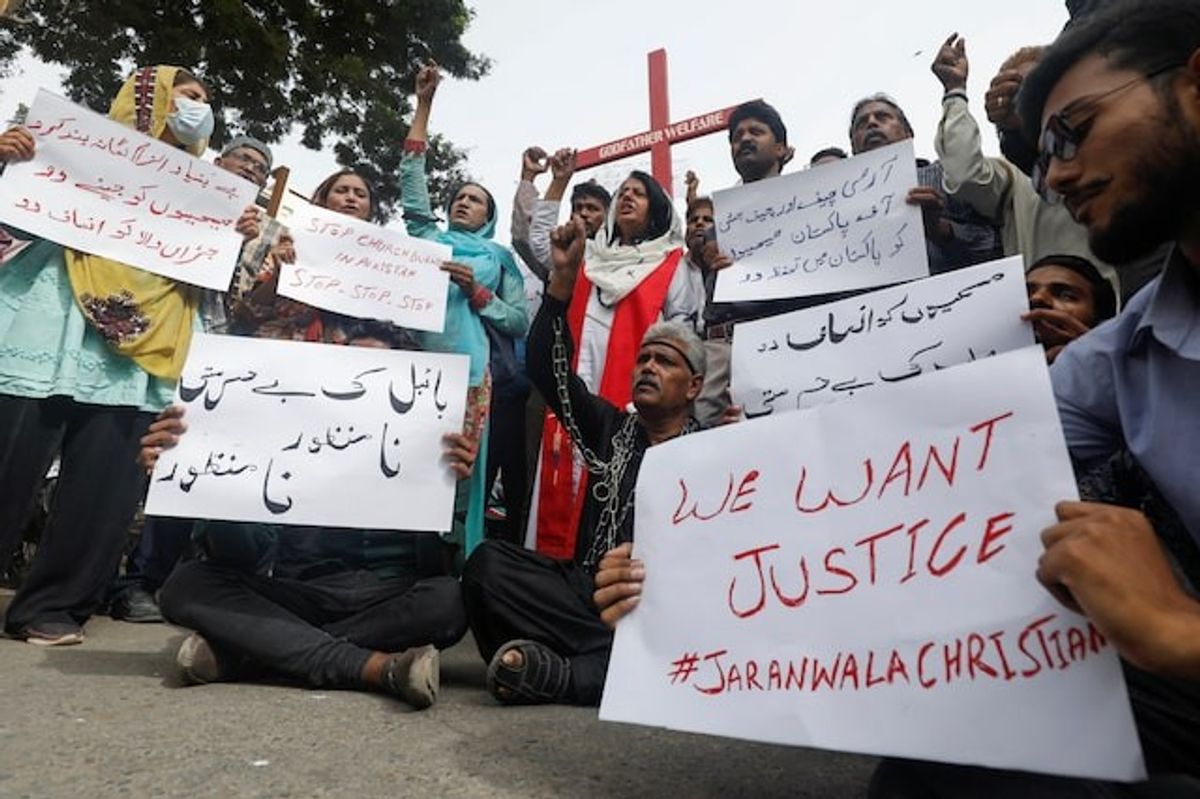Systemic neglect, rising intolerance eroding minority rights in Pakistan: report
Centre for Social Justice report urges Pakistani policymakers to focus on tangible action rather than symbolic gestures

Asma Kundi
Producer, Islamabad
Asma Kundi is a multimedia broadcast journalist with an experience of almost 15 years. Served national and international media industry as reporter, producer and news editor.

In this file photo, members of the Christian community chant slogans as they hold placards to condemn the attacks on churches and houses in Jaranwala town of Faisalabad, during a protest in Karachi, Pakistan August 17, 2023
Reuters
421 minority girls, 71% minors, forcibly converted to Islam, says the report.
Blasphemy laws misused against minorities, with over 100 cases, the report claims.
Report reveals minimal legislative focus on minority rights in 2024.
A new report by the Centre for Social Justice (CSJ) claims that Pakistan witnessed a continued rise in religious intolerance, misuse of laws, and policy neglect in 2024 -- trends the group argues are contributing to the deepening marginalization of religious minorities.
The report, Human Rights Observer , asserts that minorities in Pakistan remain especially vulnerable to systemic discrimination and targeted violence, citing patterns of legal and social abuse with limited institutional protection.
'Blasphemy laws and violence'
Among its most concerning observations, the report points to what it describes as an uptick in blasphemy-related accusations and alleged misuse of legal provisions.
According to CSJ, while Muslims constituted roughly 70% of those accused under blasphemy laws in 2024, the organization argues that members of minority communities -- Ahmadis (14%), Hindus (9%), and Christians (6%) -- continue to face disproportionate risks of harassment and false accusations.
The report identifies Punjab as the province with the highest share of such cases (62%), with cities like Sheikhupura, Lahore, Rawalpindi, Okara, and Gujranwala labelled as key hotspots.
Sindh reportedly followed with 30% of cases, including 35 from Tharparkar alone.
The report claims that certain legal provisions -- such as Sections 298-A and 295-A -- were most frequently invoked, with over 100 cases registered under each. It says laws specifically targeting the Ahmadiyya community, such as Section 298-C, were also said to be widely misused.
CSJ further reports that at least 10 individuals accused of blasphemy lost their lives in incidents spanning Lahore, Rawalpindi, Umerkot, Swat, Quetta and Karachi.
'Forced conversions and educational exclusion'
Forced conversions were another major area of concern highlighted by the organization. Between January 2021 and December 2024, the report claims that at least 421 girls from minority backgrounds were allegedly abducted and forcibly converted to Islam. These included 282 Hindu, 137 Christian, and 2 Sikh girls. CSJ contends that 71% of these victims were minors -- nearly half between the ages of 14 and 18, and more than 22% under 14. The majority of such cases were reported in Sindh (nearly 70%), followed by Punjab.
In terms of education, the report argues that minority students continue to face systemic disadvantages. CSJ claims that Islamic content is increasingly being inserted into compulsory non-religious subjects like Urdu and Pakistan Studies, which it says limits inclusivity and critical thinking. While an official policy exists to provide alternative religious education for minority students, the report notes that no textbooks have yet been published to put this into practice.
'Legislative gaps, prison inequality, and lack of documentation'
On the legislative front, CSJ points out that of the 186 bills presented in Pakistan’s federal and provincial assemblies in 2024, only 23 addressed human rights or minority-related concerns, and just one was passed into law.
The organization criticizes what it sees as a reliance on symbolic resolutions and administrative notices, rather than substantive legal reform. It also notes that although the long-delayed National Commission for Minorities Bill 2025 was introduced, the draft lacks sufficient independence or legal authority to effect meaningful change.
The report also raises concerns over disparities in prison policies, claiming that religious education-based sentence remissions granted to Muslim inmates are denied to prisoners from minority communities.
It also draws attention to what it describes as an incomplete registration of minority populations with NADRA, stating that fewer than half of those counted by the Pakistan Bureau of Statistics are formally documented -- a gap that, according to CSJ, affects access to legal protections and basic services.
Commenting on the findings, CSJ Executive Director Peter Jacob urged policymakers to prioritize real action over symbolism. “We cannot address what we continue to ignore. The time for tokenism is over. Real protections, legal reforms, and inclusive policies are needed now,” he said.
The report concludes with detailed recommendations and calls for urgent engagement by all levels of government to address what it describes as a worsening climate of exclusion and intolerance for religious minorities in Pakistan.










Comments
See what people are discussing